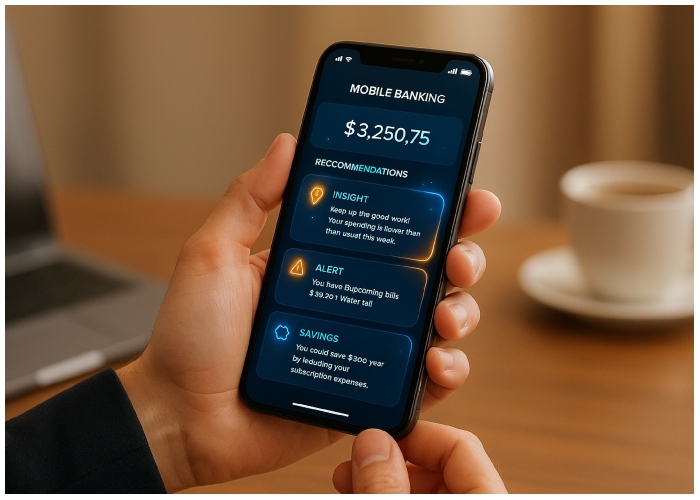Artificial intelligence is no longer a buzzword reserved for tech expos and science fiction. It’s already here—learning your habits, predicting your choices, and operating behind the scenes in ways you might not even notice. From morning routines to late-night binge sessions, AI is shaping how we live, shop, travel, and even take care of ourselves. And whether we embrace it or not, it’s becoming the silent co-pilot of modern life.
Your Smartphone: A Pocket-Sized Genius
If you own a smartphone, you’re already carrying AI in your pocket. Facial recognition unlocks your screen using machine learning that maps your unique features. Voice assistants like Siri and Google Assistant adapt to your voice, language, and habits, becoming more efficient over time. Even something as basic as your keyboard’s autocorrect is powered by AI that learns how you write.
And let’s not forget the apps. Social media platforms use AI to curate your feed, prioritize posts, and deliver targeted ads with unsettling accuracy. The more you scroll, the smarter it gets—an invisible loop of input and response that keeps you coming back.
Smarter Shopping, Seamless Spending
AI knows your taste. It’s the reason you get eerily relevant product suggestions on Amazon or Instagram. Recommendation engines analyze your browsing patterns, purchase history, and even your hesitation before clicking “Add to Cart.” This data is used to show you what you’re most likely to want—even before you realize you want it.
Retailers also utilize AI to optimize pricing in real-time. That flash sale you stumbled upon? It might have been triggered by your previous behavior or local demand patterns. AI is also behind virtual try-ons, size predictions, and customer service chatbots that provide 24/7 assistance with your questions.
Health Tech That Actually Helps
From fitness trackers to hospital diagnostics, AI is reshaping healthcare. Your Apple Watch or Fitbit doesn’t just count steps—it tracks sleep patterns, monitors heart rate, and even detects irregular rhythms that could signal serious conditions. Apps now analyze your coughing sounds, check for skin conditions via photo, or monitor your posture while working.
Hospitals and clinics are implementing AI to assist doctors in reading medical scans, identifying potential diagnoses, and tailoring treatment plans. While still supervised by professionals, these systems are reducing errors and saving lives with increased speed and precision.
Navigation and Travel Made Smarter
Every time Google Maps re-routes you due to traffic, you’re witnessing AI in action. It analyzes millions of data points from users, road sensors, and historical patterns to recommend the fastest route. Ride-hailing apps like Uber use AI to determine fare pricing, driver dispatching, and even customer behavior.
In airports, AI streamlines security checks using facial recognition and predicts potential delays based on weather, flight histories, and air traffic patterns. Behind the scenes, it optimizes airline crew scheduling and gate assignments to ensure a smooth operation.
Entertainment Tailored Just for You
Netflix knows when you binge, what genres you love, and what you’re likely to rate five stars. That’s not guesswork—it’s machine learning. Algorithms take into account your past viewing, completion rate, and even the time of day you watch. Spotify and YouTube work similarly, curating playlists and videos that seem to “get” you.
Even video game companies utilize AI to create smarter in-game opponents, generate content, and monitor player behavior to enhance the user experience.
AI in Finance: More Than Just Fraud Detection
Your bank uses AI to protect you—detecting suspicious transactions and alerting you instantly. But it also powers budgeting tools, credit scoring models, and investment robo-advisors that analyze markets and manage your portfolio with minimal human oversight.

Some financial apps go a step further by helping you track spending patterns, set goals, and find ways to save—making money management more accessible and less overwhelming.
Workplace AI: Helping or Replacing Us?
AI is streamlining business operations across industries. It screens job applications, analyzes productivity metrics, schedules meetings, and even writes emails. Tools like Grammarly refine writing, while Notion and Trello use AI to organize projects and prioritize tasks.
Customer support is increasingly automated, with chatbots handling everything from tech issues to returns. In some industries, AI is also handling data analysis and forecasting tasks once reserved for analysts and consultants.
Balancing the Benefits and Risks
With so much automation and decision-making power, concerns around AI are more relevant than ever. Bias in algorithms, data privacy, and job displacement are real issues that require ongoing oversight. For example, facial recognition systems have been criticized for racial bias, and AI-based hiring tools may unintentionally favor certain candidates.
Governments and organizations are beginning to enforce ethical AI frameworks, but progress is uneven. For the average user, being aware of how data is collected and used is the first line of defense in navigating this new era.
AI Is Here to Stay—So Use It Wisely
Artificial intelligence is no longer a glimpse into the future—it’s an ever-growing part of the present. It’s in your pocket, your home, your doctor’s office, and your bank account. As it continues to evolve, we must decide how we interact with it—conveniently, cautiously, or both. The key is not to fear AI, but to understand it—and use that understanding to shape a future that works for everyone.